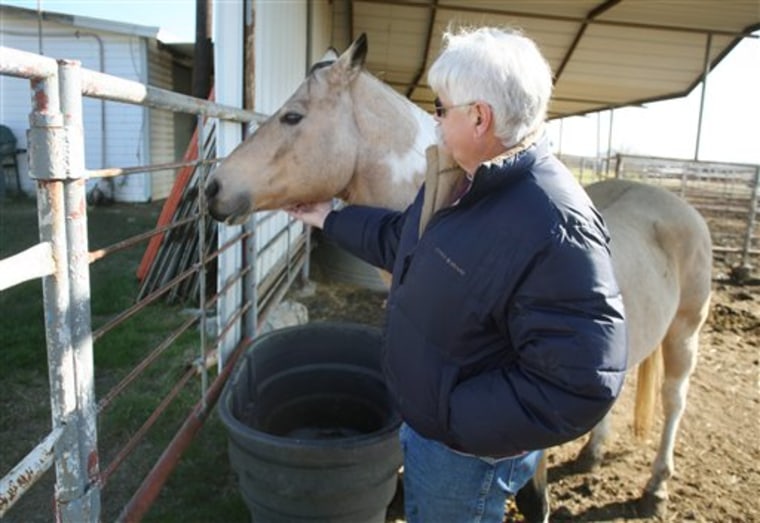Like thousands of other Texans living atop one of the country's most productive natural gas fields, folks in this tiny town were giddy when drillers started offering up the fat checks.
The mayor likened it to the Gold Rush, and many of the 200 residents of a town that once sold its name to a satellite television company were hoping to be next in a long line of landowners to strike it rich by drilling into the Texas earth.
Many in the town on the rural plains of Fort Worth didn't even bother to ask whether the drilling might sour the air above the gas-rich rock formation called the Barnett Shale. "Nobody even thought about that kind of stuff," Mayor Calvin Tillman said.
By the time state regulators started testing the air around Dish, there were 15 wells inside the town limits and more than 12,000 spread across the massive shale. Results of those tests, released late last year, found elevated levels of the cancer-causing chemical benzene near Dish, spooking residents who now fear that what once looked like found money could end up harming their health.
"I had friends of mine that got filthy rich off oil and gas companies drilling out here," said Rebecca McKamie, who wonders whether pollution is the cause of serious health problems in her family and deaths of her farm animals. "I'm not against the oil and gas industry. I'm against being poisoned."
This month, the Texas Commission on Environmental Quality is planning to release an analysis of more extensive air-quality tests above the 5,000-square-mile shale, which runs beneath Dallas, Fort Worth and about 20 counties. The agency's focusing on benzene, which can escape through equipment leaks or accidental emissions.
People are regularly exposed to small doses of benzene by industrial pollutants, cigarette smoke, gasoline fumes and vehicle emissions. But long-term exposure can cause leukemia, and the results of the testing could lead the state to take severe actions, including issuing fines or placing new, restrictive rules on drillers.
"Everything is on the table," commission spokesman Terry Clawson said.
The Texas Pipeline Association, which represents gas companies on the shale, supports the state's increased testing and is seeking more. But the group said drillers are following existing rules and don't believe their facilities are releasing harmful levels of benzene.
"I believe we are operating in a very safe manner and an environmentally friendly manner," said John Satterfield, the environmental health and safety manager at Chesapeake Energy Corp., the largest producer on the shale. "We're not poo-pooing the idea that benzene is harmful. We are trying to place it in perspective."
While Dish is the only town to formally complain to the state, the agency has taken calls from angry residents from all over the shale, most notably in Fort Worth. In Flower Mound, about 15 miles southeast of Dish, the town council last month considered but ultimately rejected a drilling moratorium driven by pollution fears.
"We've got to conduct widespread testing throughout the Barnett Shale to ensure those problems aren't elsewhere, and I think that's the lesson from Dish," said state Sen. Wendy Davis, a Fort Worth Democrat.
Signs surfaced in 2005
Dish residents started noticing problems in 2005, the same year the town changed its name from Clark in a publicity stunt, agreeing to be called Dish in exchange for free satellite TV for everybody in town.
That was also the year five gas companies opened an unmanned compressor complex, and it didn't take long for complaints to start rolling in. People were upset about noise, then the putrid and overpowering smells.
Lloyd Burgess, whose Lucky B Ranch borders the complex, said it wrecked his business and may have killed some horses. He knows he can't prove that, but points to gnarled, lifeless trees drooping between his land and the complex.
"If it kills trees, how good could it be for people?" he said.
Health problems followed for some. McKamie recently underwent a blood test that found an unusual enzyme in her liver that could be an indicator of cancer. Her daughter, Julianne, has for three years seen doctors and specialists in an effort to diagnose crushing pain in her arms, sudden loss of circulation that makes her hands turn blue and randomly occurring loss of strength.
They can't conclusively link their problems to the compressor plant or drilling, but wonder if benzene contributed.
"I don't know if it's all related. We have a right to know if it is," said McKamie, a 25-year resident of the town whose farm is about a mile from the compressor plant. "We're breathing it, we're working it, we're feeding our animals it, and then we're eating the meat."
Frustration in Dish boiled over last month, when all 50 chairs were full last month at a town meeting with state regulators. Town commissioner Tim Sciscoe said he wanted a congressional investigation and "some handcuffed perp walks" for state regulators he accused of being unresponsive.
Susana Hildebrand, the commission's chief engineer overseeing the Barnett Shale studies, took the brunt of the residents' anger.
"Sometimes when you're really upset you may not hear it, but we are really concerned about the area," she said. "All levels of this agency are involved. We want to solve this. We want to help them."
